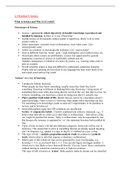2.3 Problem 5: Science
What is Science and Why Is It Useful?
Stereotypes of Science
Science = process by which objectively defensible knowledge is produced and
handled by humans. Science is ‘a way of knowing’
Seeing science as an academic subject matter is superficial, doesn’t tell us what
science really is
Other stereotypes: scientists work in laboratories, wear white coats. Also
stereotypically male
Adults see scientists as stereotypically nefarious, evil, ‘mad scientist’
Seen as different from the ‘norm’; geek = high intelligence, poor fashion sense, etc.
Stereotypes about science are problematic; science less appreciated by general
population, rejection of science as worthwhile cultural activity
Another consequence is imitation of science by posers, e.g., wearing white coats to
pose as scientist
Not all scientific jargon is long and difficult to understand, sometimes amusing.
People who are imitating are less likely to use language like that, more likely to try
and sound smart and use big words
‘Science’ as a way of knowing
Complexity behind ‘knowing’
When people say they know something, usually mean they think they know
something. Knowing is different to thinking/believing. Knowing = being aware of
something that is true while also being directly aware of the very fact that it is true. So
to know something, you must have a basis for being sure that it’s actually true
Plato: justified truth belief (JTB). Beliefs that are correct by coincidence doesn’t
equal knowledge. There is more to ‘knowing’ than simply believing things are true.
For something to be knowledge, needs to meet all 3 requirements: to be justified, to
be true, and to be believed
Some philosophers argue that JTB conditions are insufficient
Gettier conjunctive beliefs. 2 beliefs combined into either/or statement, e.g., ‘I
believe that John drives a blue car or that Mary is in Barcelona’. ‘John drives a blue
car’ might be justified but untrue, ‘Mary is in Barcelona’ may be unjustified by true
But because the sentence is separated by ‘or’, the statement becomes both justified &
true
Types of info we know will fall into different categories. Some info will be true by
definition. This means that it refers to something that has an already agreed meaning,
can’t be disputed, e.g., spaniel is a type of dog bc it’s defined as a type of dog
This type of info = analytic proposition/analytic truth (in contrast to synthetic
truth, which refers to info that requires evidentiary confirmation)
Other types of info which are true can be generated by your own thoughts, e.g.,
knowing 1+1=2, so you know that 2-1=1. You can also figure out bigger number -1,
which you’re less likely to have been told directly. You can ‘know’ these conclusions
without having to consult an external source or look for evidence
This type of info is known as ‘axiom’. Both analytic truths & axioms can be classified
, as types of truism, which is the term used to describe claims that are true without
question
Complications arise when we feel we ‘know’ something with subjective certainty
without it being true by definition, e.g., belief that sun will rise tomorrow. This info
‘feels’ obvious to us. But treating something as ‘true’ just bc it feels true is
problematic, might be false. E.g., view that poverty causes criminality. Seen as true,
bc these 2 conditions are often seen together, but this doesn’t mean that one caused
the other, maybe instead of poverty causing criminality, criminality caused poverty, or
maybe they caused one another simultaneously, or other factors are involved, or
maybe it’s a coincidence
Correlation does not imply causation
But we can become overly cautious; instead of treating correlational associations as
potentially weak, we treat them as if they were misleading
Correlation is not all bad; while correlation doesn’t imply causation, causation does
imply correlation.
Poverty-related scenarios represent each of the alternative, non-causal interpretations
of correlation:
1) Criminality caused poverty reverse causality
2) They caused one another simultaneously confounding
3) Other factors involved dependence on synergies
4) Coincidence
Because of these 4, straightforward causality is often forgotten
Correlation does not imply causation causes confusion; answering the phone when
it rings, stepping away from something hot, etc. all require ability to infer causation
from observed correlations. But still, just bc something seems ‘obvious’, doesn’t
mean that it’s true
We turn to others for knowledge; this has built much of human knowledge
Conclusion: some of the things we claim to ‘know’ are true by definition, others ‘feel’
true, other info is passed on from 3rd parties
Science as a formal process of knowledge-generation
Ideal of science is to eliminate role of subjective judgment in knowledge-generation,
so error can be avoided
Deduction = premises of successively lessening generality are combined to produce
an irrefutably true conclusion, e.g., if you know that all dogs are mammals and that
your friend has a pet dog, then you are using deduction when you conclude that your
friend’s pet is a mammal (general specific)
Induction = specific pieces of info derived from larger group are considered together,
a pattern is identified, and a conclusion about the larger group is drawn on the basis
that the pattern will continue. E.g., if you know your friend has 25 pets, and that 24 of
them are dogs, then you are using induction if you conclude that 25th is also a dog
(specific general)
While deduction is always true (all dogs are mammals), induction is not necessarily
true (friend’s 25th pet might not be a dog). Deduction is a form of re-instating what is
already known, while inductions are a form of generalisation





